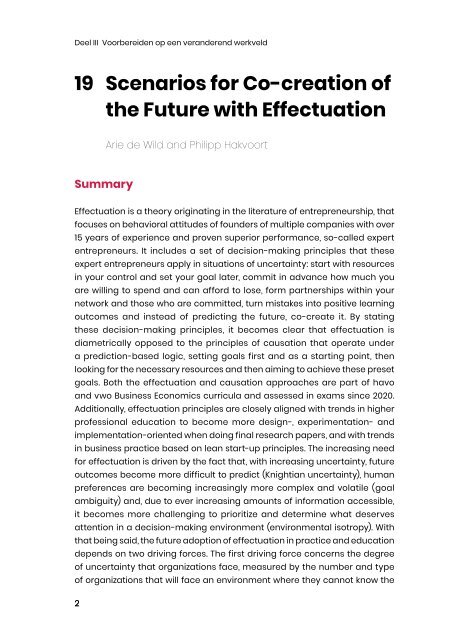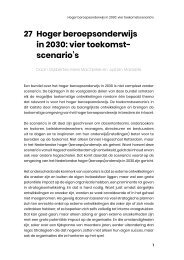19. Scenarios for Co-creation of the Future with Effectuation
You also want an ePaper? Increase the reach of your titles
YUMPU automatically turns print PDFs into web optimized ePapers that Google loves.
Deel III Voorbereiden op een veranderend werkveld<br />
19 <strong>Scenarios</strong> <strong>for</strong> <strong>Co</strong>-<strong>creation</strong> <strong>of</strong><br />
<strong>the</strong> <strong>Future</strong> <strong>with</strong> <strong>Effectuation</strong><br />
Arie de Wild and Philipp Hakvoort<br />
Summary<br />
<strong>Effectuation</strong> is a <strong>the</strong>ory originating in <strong>the</strong> literature <strong>of</strong> entrepreneurship, that<br />
focuses on behavioral attitudes <strong>of</strong> founders <strong>of</strong> multiple companies <strong>with</strong> over<br />
15 years <strong>of</strong> experience and proven superior per<strong>for</strong>mance, so-called expert<br />
entrepreneurs. It includes a set <strong>of</strong> decision-making principles that <strong>the</strong>se<br />
expert entrepreneurs apply in situations <strong>of</strong> uncertainty: start <strong>with</strong> resources<br />
in your control and set your goal later, commit in advance how much you<br />
are willing to spend and can af<strong>for</strong>d to lose, <strong>for</strong>m partnerships <strong>with</strong>in your<br />
network and those who are committed, turn mistakes into positive learning<br />
outcomes and instead <strong>of</strong> predicting <strong>the</strong> future, co-create it. By stating<br />
<strong>the</strong>se decision-making principles, it becomes clear that effectuation is<br />
diametrically opposed to <strong>the</strong> principles <strong>of</strong> causation that operate under<br />
a prediction-based logic, setting goals first and as a starting point, <strong>the</strong>n<br />
looking <strong>for</strong> <strong>the</strong> necessary resources and <strong>the</strong>n aiming to achieve <strong>the</strong>se preset<br />
goals. Both <strong>the</strong> effectuation and causation approaches are part <strong>of</strong> havo<br />
and vwo Business Economics curricula and assessed in exams since 2020.<br />
Additionally, effectuation principles are closely aligned <strong>with</strong> trends in higher<br />
pr<strong>of</strong>essional education to become more design-, experimentation- and<br />
implementation-oriented when doing final research papers, and <strong>with</strong> trends<br />
in business practice based on lean start-up principles. The increasing need<br />
<strong>for</strong> effectuation is driven by <strong>the</strong> fact that, <strong>with</strong> increasing uncertainty, future<br />
outcomes become more difficult to predict (Knightian uncertainty), human<br />
preferences are becoming increasingly more complex and volatile (goal<br />
ambiguity) and, due to ever increasing amounts <strong>of</strong> in<strong>for</strong>mation accessible,<br />
it becomes more challenging to prioritize and determine what deserves<br />
attention in a decision-making environment (environmental isotropy). With<br />
that being said, <strong>the</strong> future adoption <strong>of</strong> effectuation in practice and education<br />
depends on two driving <strong>for</strong>ces. The first driving <strong>for</strong>ce concerns <strong>the</strong> degree<br />
<strong>of</strong> uncertainty that organizations face, measured by <strong>the</strong> number and type<br />
<strong>of</strong> organizations that will face an environment where <strong>the</strong>y cannot know <strong>the</strong><br />
2


















